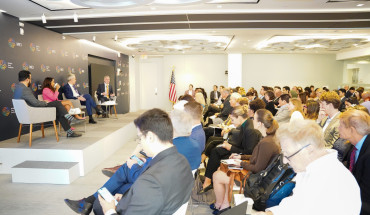This Opinion first appeared in the Huffington Post on November 11, 2011
On November 28th, millions of Egyptians will finally breathe a deep sigh of relief as they gather at the polls to vote in the first phase of parliamentary elections following the ousting of the Mubarak regime.
In these landmark elections, Egyptians will cast their vote for the first time without a pre-determined outcome, as the most populous Arab country holds its first free and fair election in modern history. Furthermore, the results of this vote will create a parliament that will, upon forming a committee of one hundred people, draft the new Egyptian constitution. This historic benchmark will mark the beginning of the end of what has proved to be a tumultuous transitional period, polarizing society between liberal and religious forces, pitting proponents of a civil state against those favoring a religious one, and dividing Muslims and Copts along sectarian lines.
The extension of the transitional period by the ruling Supreme Council of Armed Forces (SCAF) has added to the sense of impatience and agitation permeating through Egyptian society, and the upcoming vote will serve as a welcome beginning of the end of this difficult time.
Egypt's bicameral parliament consists of an upper house, the Majlis al-Shura, and a lower house, or People's Assembly, the Majlis al-Sha'b, with 270 and 498 seats respectively. The upcoming parliamentary and Shura council elections will occur in three stages, each with its own run-off, beginning November 28, 2011 and running until early March 2012.
As for participation in the election, the 2010 parliamentary elections, the final elections held under Mubarak's rule, were far from fair or transparent and saw Mubarak's National Democratic Party win over 90 percent of the vote. To quell fears of a similar outcome for the upcoming elections, SCAF has repeatedly assured Egyptians at home and abroad that they will be the fairest and most transparent contest in the history of modern Egypt, even calling for them to be supervised by an independent judicial body.
Egyptians expect that the elections will result in the highest turnout in the country's history, especially given the 70 percent turnout rate for the recent elections in Tunisia following the disposal of Ben Ali. The more than 18 million Egyptians (41 percent of eligible voters) who participated in the March 2011 constitutional referendum further indicate a change in public attitudes about elections since the single-digit participation levels during the time of Mubarak.
Egypt's election will witness the participation of new political players for the first time, previously banned political forces such as the Salafists and the Muslim Brotherhood, as well as several liberal and leftist parties, who will participate in the Egyptian elections along with old established political parties such as al Wafd and al Taggamoa. And for the first time, there is no state or regime sponsored party.
The Minister of Information's announcement that all political parties will receive equal time to campaign on air shows that the Egyptian media will, for the first time in its history, act in a fair and unbiased manner during the elections. This policy runs counter to the past, when regime-run newspaper and TV stations campaigned heavily for the Mubarak Party, heavily criticizing and/or refusing to cover other parties. The fact that nearly 30 percent of the country's population is illiterate enhances the importance of the Egyptian media's role in the upcoming elections, particularly that of audio-visual mediums such as television and radio.
Still, the looming challenges for the election and democratic process are numerous and complex. Two scenarios threaten to derail this transition to democracy: First, it is critical to note that even under Mubarak's one-party rule, when election outcomes were essentially predetermined, local leaders resorted to violence and coercion to intimidate voters. The deepening polarization of Egyptian society and deteriorating security conditions suggest that these elections will also be accompanied by violence, which may compel the SCAF to cancel elections after the first round and further extend the already protracted transitional period.
Second, although a ruling by the Administrative Court on October 25th confirmed that Egyptians expatriates have the right to vote in these elections, the Egyptian bureaucracy is not yet ready to facilitate such a rule, which only helps further support assertions that these historic elections are destined to be illegitimate and incomplete.
In short, Egyptians need to find a way to overcome the deep-rooted tradition of electoral fraud and corruption that framed these contests not as a competition between programs and ideas, but rather a competition between individuals and families with influence and mobilization power. The first elections following in the wake of the revolution must pave the way for the free and fair election of the first president in the second Republic of Egypt.
The Middle East Institute (MEI) is an independent, non-partisan, non-for-profit, educational organization. It does not engage in advocacy and its scholars’ opinions are their own. MEI welcomes financial donations, but retains sole editorial control over its work and its publications reflect only the authors’ views. For a listing of MEI donors, please click here.













